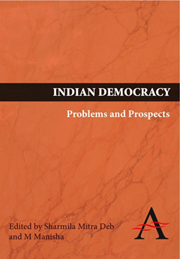Book contents
- Frontmatter
- Contents
- List of Contributors
- PREFACE
- Introduction DEMOCRATIC POLITICS IN INDIA: CONCEPTS, CHALLENGES AND DEBATES
- 1 RECONSTRUCTING DEMOCRATIC CONCERNS IN INDIA
- 2 ARE WE READY FOR DEMOCRACY? A FEW OBSERVATIONS
- 3 DEMOCRACY AND POVERTY IN INDIA
- 4 DEMOCRACY AND FEDERALISM IN INDIA: TWO EPISODES AND A SET OF QUESTIONS
- 5 INDIA'S COALITION FUTURE?
- 6 HOW DEMOCRATIC IS OUR PARLIAMENT? ELITE REPRESENTATION AND FUNCTIONAL EFFICIENCY OF LOK SABHA
- 7 DEMOCRACY'S JANUS FACE: A REVIEW OF ELECTIONS IN POST-INDEPENDENCE INDIA
- 8 THE NATURE OF THE OPPOSITION IN INDIA'S PARLIAMENTARY DEMOCRACY
- 9 RESTYLING DEMOCRACY? MAINSTREAM MEDIA AND PUBLIC SPACE VIS-À-VIS INDIAN TELEVISION
- 10 THE POOR WORKING WOMEN: THE ACHILLES HEEL OF INDIAN DEMOCRACY – A PROFILE OF THE MAIDSERVANT FROM THE BUSTEES OF KOLKATA
- 11 HOW IS DEMOCRACY IN SOUTH ASIA? A COMPARISON OF THE ELITE AND THE MASS ATTITUDES
5 - INDIA'S COALITION FUTURE?
Published online by Cambridge University Press: 05 March 2012
- Frontmatter
- Contents
- List of Contributors
- PREFACE
- Introduction DEMOCRATIC POLITICS IN INDIA: CONCEPTS, CHALLENGES AND DEBATES
- 1 RECONSTRUCTING DEMOCRATIC CONCERNS IN INDIA
- 2 ARE WE READY FOR DEMOCRACY? A FEW OBSERVATIONS
- 3 DEMOCRACY AND POVERTY IN INDIA
- 4 DEMOCRACY AND FEDERALISM IN INDIA: TWO EPISODES AND A SET OF QUESTIONS
- 5 INDIA'S COALITION FUTURE?
- 6 HOW DEMOCRATIC IS OUR PARLIAMENT? ELITE REPRESENTATION AND FUNCTIONAL EFFICIENCY OF LOK SABHA
- 7 DEMOCRACY'S JANUS FACE: A REVIEW OF ELECTIONS IN POST-INDEPENDENCE INDIA
- 8 THE NATURE OF THE OPPOSITION IN INDIA'S PARLIAMENTARY DEMOCRACY
- 9 RESTYLING DEMOCRACY? MAINSTREAM MEDIA AND PUBLIC SPACE VIS-À-VIS INDIAN TELEVISION
- 10 THE POOR WORKING WOMEN: THE ACHILLES HEEL OF INDIAN DEMOCRACY – A PROFILE OF THE MAIDSERVANT FROM THE BUSTEES OF KOLKATA
- 11 HOW IS DEMOCRACY IN SOUTH ASIA? A COMPARISON OF THE ELITE AND THE MASS ATTITUDES
Summary
It is now more than 50 years since we have become a republican democracy. Even 50 years is a long time, and within 50 years dramatic changes can take place in a nation's life. Let me provide one or two examples of such dramatic changes. We know that the most powerful, feared, respected and perhaps the most despised emperor of the Mughals, Aurangzeb, who took the Mughal Empire to the zenith of its power, died in 1707, and exactly in 50 years, in 1757, the Battle of Plassey took place, which marked the end of the mighty Mughals and the beginning of a completely new chapter in India's history. Could anybody anticipate this at the time of Aurangzeb's death? To give another example: on 22 June 1897, London was celebrating Queen Victoria's diamond jubilee with great pomp and splendour, for it was not merely a celebration but also an emphatic assertion of Great Britain's lone superpower status in the world. Across the Atlantic, The New York Times, desperately feeling the need to make the US a part of this glorious moment, editorialized, ‘we are a part of the Greater Britain which seems so plainly destined to dominate this planet’. Again, in exactly 50 years time, in 1947, the most precious jewel would be removed from the British Crown and Great Britain would lose its superpower status forever to none other than the US.
- Type
- Chapter
- Information
- Indian DemocracyProblems and Prospects, pp. 51 - 65Publisher: Anthem PressPrint publication year: 2009



